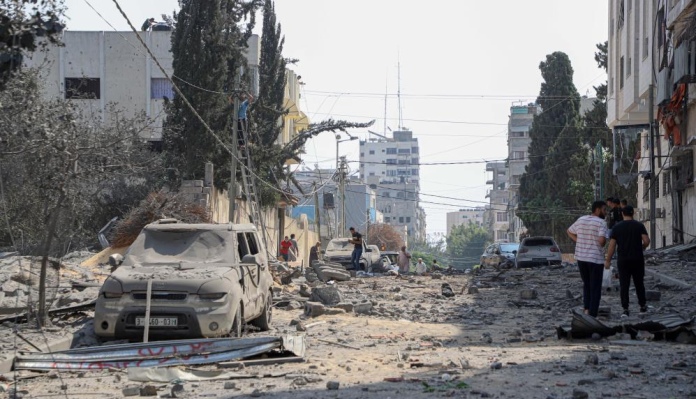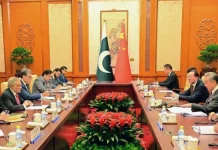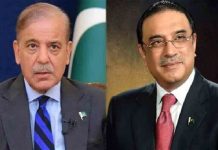
—– Israeli bombardment on civilians continues
—– Apartments , mosque, hospitals among sites attacked in Gaza
—– Over 770 Palestinians, including eight journalists, killed, 4,000 wounded
—– Israeli death toll climbs to 900
—– WHO calls for humanitarian corridor
GAZA: The death toll from the ongoing conflict between Israel and Hamas has risen to 1,800, with approximately 1,000 Israelis killed and 830 Palestinians reported martyred.
Israel refused a request to bring food and medical supplies into the Gaza Strip, Hussein Al-Sheikh, secretary general of the executive committee of the Palestine Liberation Organization (PLO) said Tuesday.
“We call on the international humanitarian institutions and the international community to intervene urgently to stop the aggression, allow the entry of relief materials, and restore electricity and water, because the Gaza Strip is facing a major humanitarian catastrophe,” he said.
Additionally, around 200,000 Palestinians have been displaced due to the airstrikes on the Gaza Strip. The situation continues to deteriorate, with both sides engaged in hostilities, leading to the exacerbation of the humanitarian crisis in the region.
Joe Biden says Hamas attacks on Israel were ‘sheer evil’
US President Joe Biden, in a televised speech Tuesday, said that the attack by Hamas on Israel was “sheer evil.”
“There are moments in this life — I mean this literally — when a pure unadulterated evil is unleashed on this world,” the 80-year-old said in a televised speech. “This is an act of sheer evil.”
The Israeli military spokesperson, Daniel Hagari, stated that no Hamas fighters had crossed the fence in the past 24 hours, but the possibility that some remained in Israeli-controlled areas was not ruled out.
Mines were being planted in areas where the barrier was breached to prevent further infiltrations.
The situation has been exacerbated by Hamas’s unprecedented ground, air, and sea assault, which Israel has compared to the September 11, 2001 attacks on the US.
The conflict has left Israel reeling, with a significant loss of life and damage to infrastructure.
Rockets fired from Gaza and Lebanon
Hamas fired rockets into Israel’s city of Ashkelon from Gaza, following warnings to residents to evacuate their homes. Additionally, rockets were fired from southern Lebanon towards Israel, leading to retaliatory fire.
The situation on the Israeli-Lebanese border has escalated, with the exchange of rocket fire raising concerns of further violence in the region.
Bodies of Hamas fighters found in Israel
Israeli authorities have reported finding around 1,500 bodies of Hamas fighters in Israel around the Gaza Strip. These discoveries have occurred as Israeli airstrikes continue to target the Palestinian enclave.
Security forces claim to have “more or less restored control over the border” with Gaza, and efforts are being made to build infrastructure for future operations.
Iran denies involvement in Hamas attack
Iran’s Supreme Leader Ayatollah Ali Khamenei has denied any Iranian involvement in the Hamas attack on Israel, despite Iran’s support for the Palestinian group.
Khamenei emphasised that Iran defends Palestine and its struggles but denied any direct role in the military operation.
The conflict has escalated Middle East tensions, and Hamas has called on resistance fighters in various regions to join its efforts.
Gaza hospitals left without aid
Hospitals in Gaza are facing a dire situation, with a lack of aid following Hamas’s attack in Israel and the Israeli army’s response.
Humanitarian organisations are calling for a humanitarian corridor to ensure the entry of urgent medical aid into Gaza’s hospitals.
Israel’s declaration of a “total blockade” on Gaza, including the prohibition of food and fuel supplies, has raised concerns about potential war crimes.
International reactions and concerns
The ongoing conflict has had global repercussions, including a surge in oil prices due to fears of tightening supplies. Various countries and organizations are reviewing their aid and support to the Palestinians in light of the situation.
Diplomatic efforts to end the conflict have faced significant challenges, given the unprecedented nature of the Hamas assault. Turkish President Recep Tayyip Erdogan has engaged in diplomatic efforts, urging both sides to respect the “ethics” of war.
Furthermore, the United Nation’s human rights commissioner said Israel’s total siege of the Gaza Strip, depriving civilians of goods essential for survival, is banned under international law.
The statement comes a day after Israel imposed a complete blockade on the Gaza Strip including a ban on electricity, water, food, and fuel, and called up an unprecedented 300,000 reservists, raising fears it planned a ground assault.
Volker Turk, the UN high commissioner for human rights, said people’s dignity and lives had to be respected as he called for all sides to defuse the “explosive powder-keg situation”.
“International humanitarian law is clear: the obligation to take constant care to spare the civilian population and civilian objects remains applicable throughout the attacks,” Turk said in a statement.
The siege risk seriously compounding the already dire human rights and humanitarian situation in Gaza, including the capacity of medical facilities to operate, especially in light of increasing numbers of injured, the statement said.
“The imposition of sieges that endanger the lives of civilians by depriving them of goods essential for their survival is prohibited under international humanitarian law,” Turk said.
Any restrictions on the movement of people and goods to implement a siege must be justified by military necessity or may otherwise amount to collective punishment, the statement added. –Agencies



